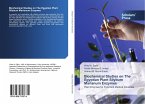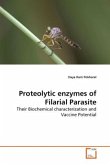The human kallikrein family is a family of proteolytic enzymes, classified as serine proteases, that derive from chromosome 19, locus 13.3-13.4. One member of the family, human kallikrein 4 (hK4) which is thought to carry out crucial functions in the prostate, was expressed in this study as a secreted protein in a baculovirus expression system, bearing a His-tag and V5-epitope that were used for purification and detection respectively. Computational analysis was included by applying high-performing computing techniques, such as molecular dynamics, and flexible ligand docking, to predict antigenic regions, the likely substrate specificity and putative inhibitors. These results show that hK4 has a loop, between Leu83-Ser94 that shows promise as a specific segment that can be exploited for generation of antibodies. The principles of substrate-specificity analysis that were developed were further applied on three metzincins, MMP-3, ADAM-9 and ADAM-10. These three enzymes are metalloproteases, which are involved in tissue remodeling, intracellular signalling and cell-to-cell mediation. This study is a demostration of the power of combining bioinformatics + wet-lab biochemistry.
Bitte wählen Sie Ihr Anliegen aus.
Rechnungen
Retourenschein anfordern
Bestellstatus
Storno








